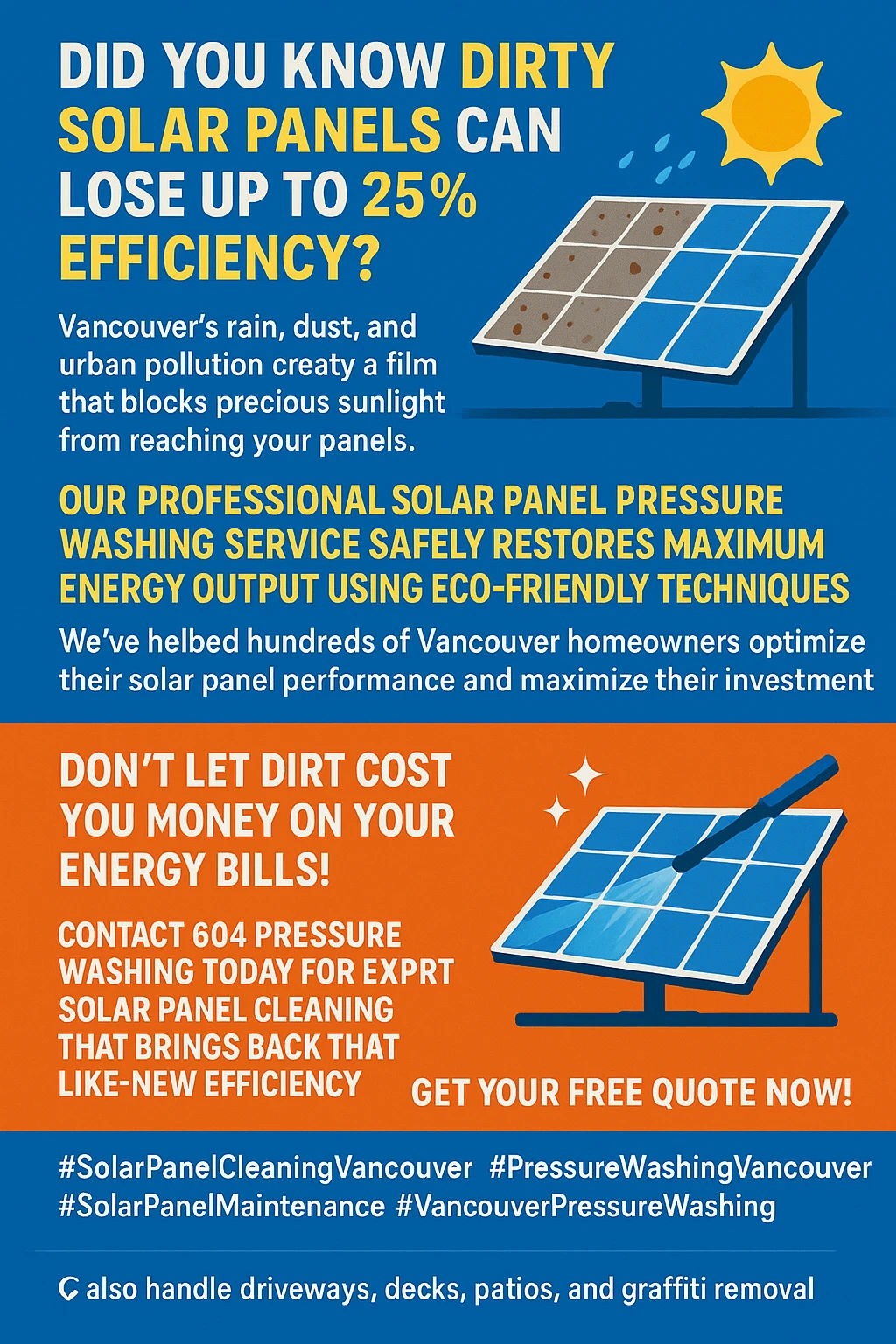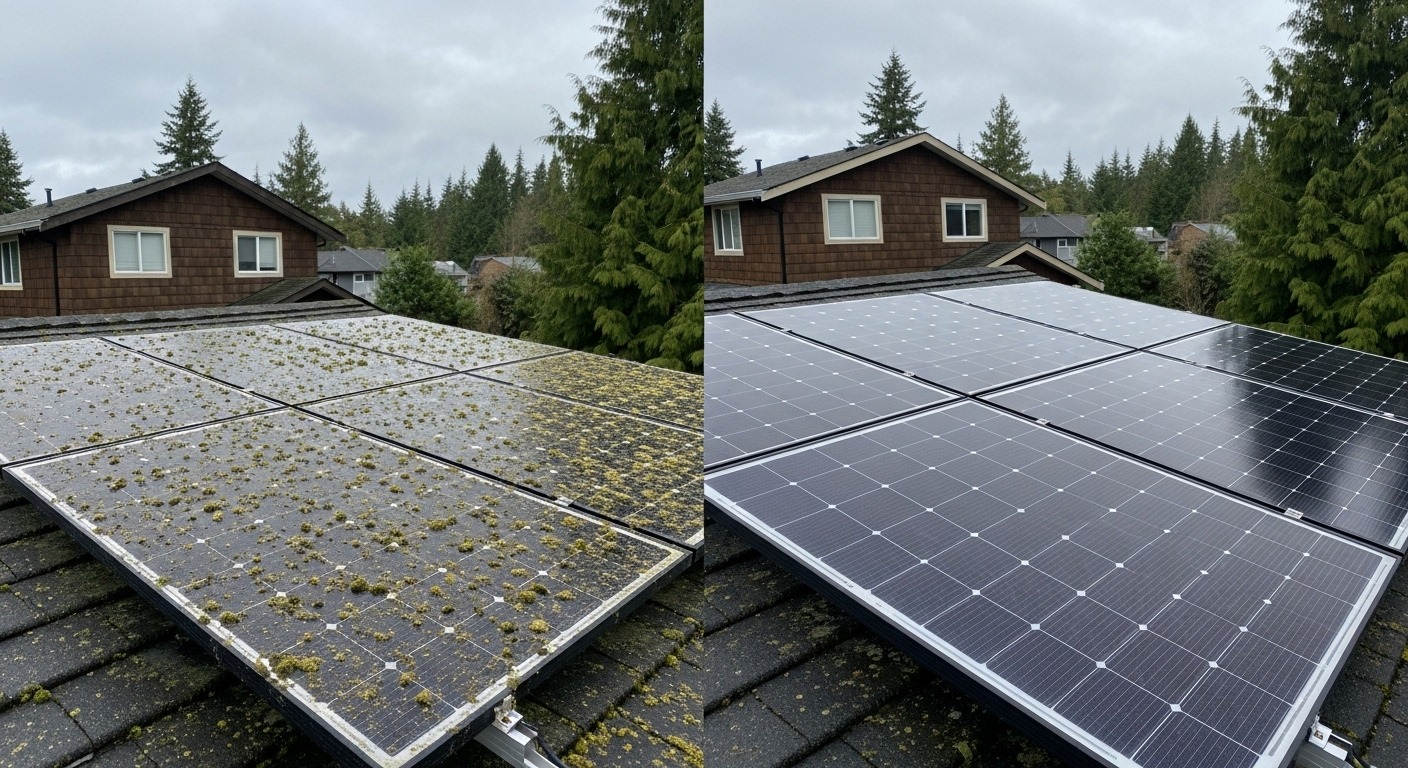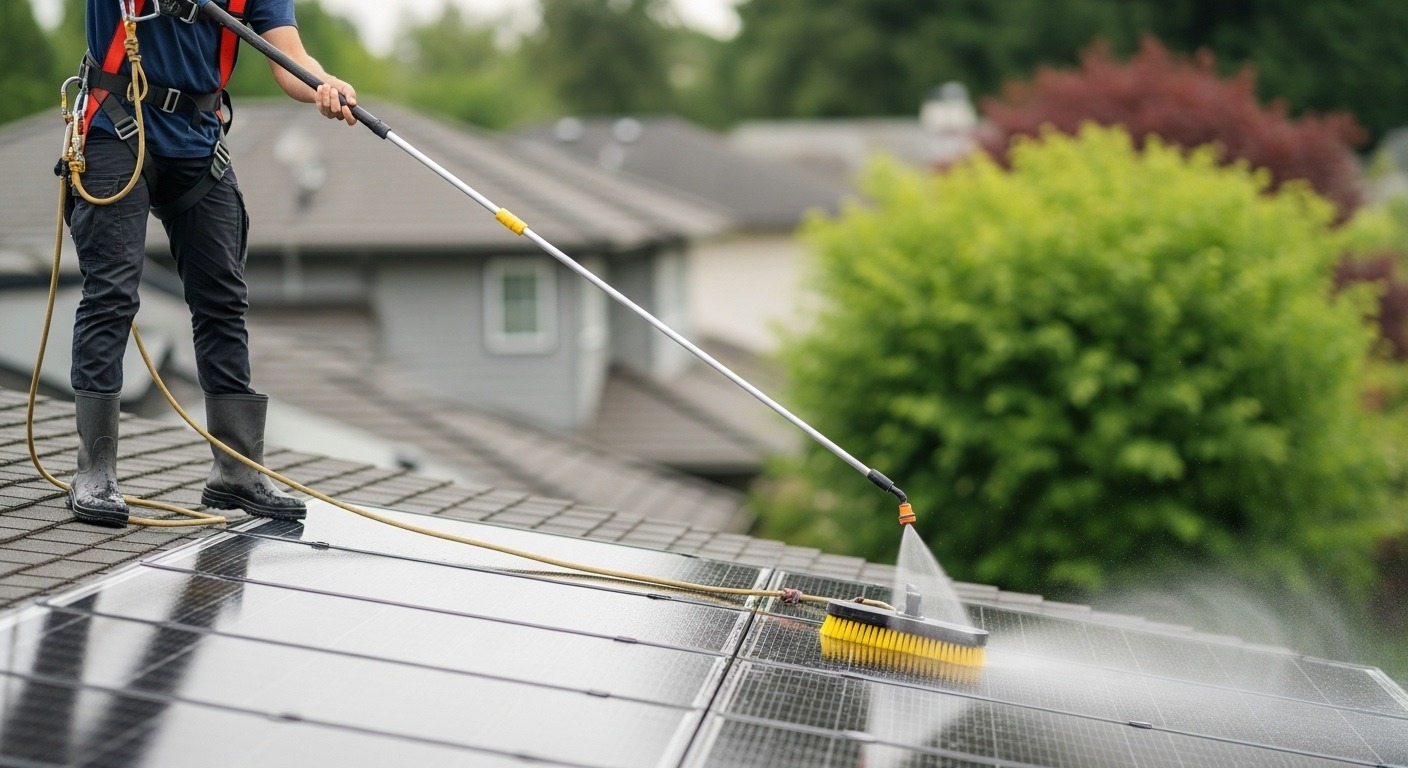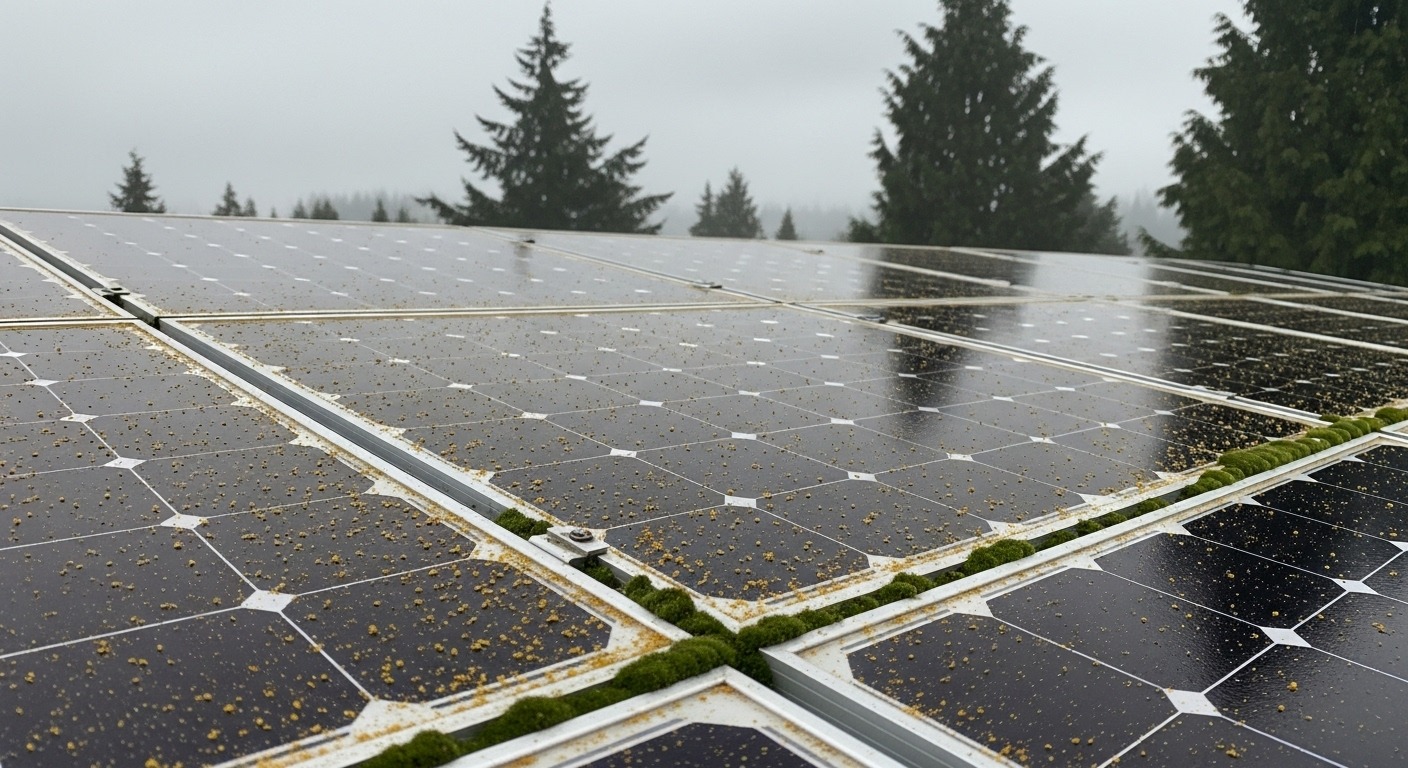Why Your Vancouver Home’s Solar Panels Are Losing Efficiency (And How Professional Pressure Washing Can Restore 25% More Energy Output)
Wondering why your Vancouver solar panels aren’t producing the energy output they promised when first installed? The culprit might be simpler than you think – accumulated dirt, moss, and atmospheric pollutants could be blocking up to 25% of your system’s potential, but professional pressure washing techniques can dramatically restore that lost efficiency.
Picture this: you invested thousands in a beautiful solar panel system, dreaming of those sweet energy savings and feeling good about your carbon footprint reduction. Fast forward a year or two, and you’re scratching your head wondering why your electricity bills haven’t dropped as much as expected. Here’s the thing that surprised me when I first started researching home solar maintenance – even the cleanest-looking panels can harbor efficiency-killing buildup that’s practically invisible to the naked eye.
Living in Vancouver comes with its own unique set of challenges for solar panel owners. Our mild, rainy climate might seem like nature’s built-in cleaning system, but it’s actually creating the perfect storm for moss growth, pollen accumulation, and atmospheric pollutant buildup. The research is pretty eye-opening: Duke University found that pollution alone can reduce solar panel efficiency by up to 25 percent, while Google’s own solar installation saw output double on some panels after their first professional cleaning session.
The good news? Professional pressure washing services have developed specialized techniques that can safely restore your panels to near-original efficiency without risking the damage that comes from DIY high-pressure cleaning attempts. We’re talking about low-pressure systems designed specifically for photovoltaic cells, eco-friendly cleaning solutions, and technicians who understand the delicate balance between thorough cleaning and panel protection.
Key Outtakes:
- Vancouver’s humid climate promotes moss and organic growth that can reduce solar panel efficiency by 25-50% when left untreated
- Professional low-pressure washing (under 1,500 psi) safely restores efficiency while high-pressure DIY cleaning can cause permanent microcracks
- Google’s research documented efficiency improvements of up to 36% through proper professional cleaning techniques
- Twice-yearly professional cleaning costs $150-300 per residential visit but provides strong ROI through restored energy production
- Specialized eco-friendly cleaning solutions and safety equipment make professional services essential for maintaining warranties and preventing damage

The Hidden Efficiency Killers on Your Vancouver Solar Panels
Let me tell you about something that blew my mind when I first learned about solar panel maintenance. You know how we always assume rain washes everything clean? Well, turns out that’s one of the biggest misconceptions about living in our beautiful, drizzly city. Vancouver’s frequent precipitation actually creates the perfect breeding ground for efficiency-destroying contaminants that stick to your panels like glue. 
The science behind this is fascinating and frustrating at the same time. Our mild, rainy climate with those frequent overcast days leads to a buildup of dirt, dust, and moss on solar panels that actively blocks sunlight absorption. Unlike drier climates where dust might blow away or get washed off easily, Vancouver’s atmospheric conditions create a sort of organic cement that bonds to panel surfaces. Recent university research shows that a dirty solar panel can lose 50% of its efficiency compared to a clean panel – that’s literally half your investment sitting there, underperforming.
What’s particularly sneaky about Vancouver’s efficiency killers is how they work together. Atmospheric pollution particles, though they make up only about 8 percent of accumulated debris, have a disproportionate impact on panel efficiency because they’re especially effective at blocking light transmission. Add in our spring pollen loads, fall leaf debris, and year-round moss spores, and you’ve got a recipe for significant energy loss. The National Renewable Energy Laboratory reports that soiling accounts for up to 7% of annual energy loss in the United States, but in Vancouver’s unique environment, those figures can climb much higher.
Why Professional Pressure Washing Is Your Panel’s Best Friend
Now, before you grab your trusty pressure washer from the garage and head up to the roof, let me save you from making a costly mistake that I’ve seen too many homeowners make. The relationship between pressure washing and solar panels is like that perfect friend who knows exactly how much to push you without crossing the line – it requires finesse, expertise, and the right equipment. 
Professional pressure washing for solar panels is a completely different beast than cleaning your driveway or siding. We’re talking about specialized low-pressure systems that maintain water pressure below 1,500 psi, using wide-angle nozzles that distribute pressure evenly across panel surfaces. This isn’t your typical blast-everything-clean approach – it’s more like giving your panels a therapeutic spa treatment that removes contaminants while preserving their delicate photovoltaic cells.
The construction of solar panels makes this precision crucial. Those beautiful panels consist of fragile photovoltaic cells laminated under tempered glass, and here’s where things get scary with DIY pressure washing. High-pressure washing focused on particular spots can create pressure on the cells below the glass, leading to microcracks that you might not even see but can significantly reduce panel performance. Studies show these microcracks can cause increased electrical resistance, elevated temperatures, and the creation of hotspots that may lead to permanent damage or even fire risk.
Professional technicians bring specialized equipment that most homeowners simply don’t have access to. We’re talking extension wands for safe roof access, pressure settings calibrated for different panel types, and eco-friendly cleaning solutions that effectively break down organic matter without leaving residues. They understand the subtle differences between panel manufacturers, mounting systems, and the importance of proper electrical shutdown procedures during cleaning.
The technique itself is almost artistic in its precision. Professional services start with a thorough inspection to identify any existing damage or problem areas, then use a systematic approach that begins with low-pressure rinsing to remove loose debris. Next comes the application of specialized cleaning solutions designed to break down moss, pollen, and pollution buildup, followed by gentle mechanical cleaning with soft-bristled brushes where necessary. The final rinse uses deionized or distilled water to prevent mineral deposits that can affect long-term performance.
Vancouver’s Climate: The Perfect Storm for Solar Panel Challenges
Living in Vancouver means dealing with environmental conditions that create a unique cocktail of solar panel challenges you simply won’t find in sunnier, drier climates. Understanding these specific factors has completely changed how I think about solar panel maintenance, and it should influence your approach too. 
Our city’s proximity to the ocean brings more than just beautiful views and fresh air. The marine climate creates slightly acidic conditions that can accelerate the breakdown of atmospheric pollutants on panel surfaces, essentially cooking them into a stubborn film that’s incredibly difficult to remove without professional intervention. This is why you might notice that even after a heavy rainstorm, your panels don’t look as clean as you’d expect.
The seasonal variations in Vancouver create a year-round maintenance challenge that requires strategic thinking. Spring brings massive pollen loads from our abundant urban forest – those beautiful cherry blossoms and flowering trees create a yellow dust storm that settles on every horizontal surface, including your solar panels. Summer’s relatively dry conditions allow this organic matter to bake onto panel surfaces, creating a foundation for further buildup.
Fall introduces a whole new set of challenges with leaf debris and organic matter that creates perfect conditions for biological growth. Unlike simple dust that might blow away, decomposing organic matter creates nutrients that feed moss and algae growth throughout Vancouver’s mild winter months. The temperature rarely drops far enough to kill these organisms, so they continue growing slowly but steadily, creating an increasingly thick barrier between your panels and the precious sunlight they need to generate electricity.
Winter conditions present their own unique problems. While we don’t get the heavy snow loads that might damage panels in other climates, our frequent freeze-thaw cycles can cause contaminants to bond more tightly to panel surfaces. Ice formation can also trap pollutants against the glass, concentrating their impact on light transmission when they finally melt and evaporate.
What makes Vancouver’s climate particularly challenging is the consistency of these conditions. In desert climates, you might get periodic windstorms that naturally clean panels, or heavy seasonal rains that wash away accumulated dust. Here, our gentle, persistent precipitation mostly just activates and spreads contaminants rather than removing them.
The Dramatic Results: Real Numbers from Professional Cleaning
The transformation that happens when professionals properly clean solar panels is honestly mind-blowing, and the documented results from major installations provide compelling evidence for why this investment makes financial sense for Vancouver homeowners.
Google’s experience with their 1.6 MW solar installation provides some of the most comprehensive data available on professional cleaning effectiveness. After fifteen months without cleaning, their first professional cleaning session doubled output on some panels – imagine suddenly getting twice the energy production you were expecting! But here’s where it gets even more interesting: their second cleaning eight months later increased efficiency by an additional 36 percent, proving that regular professional maintenance compounds the benefits over time.

